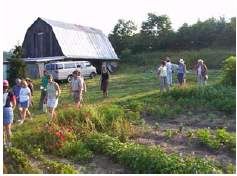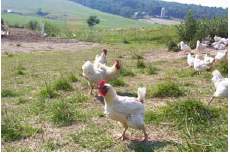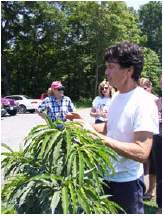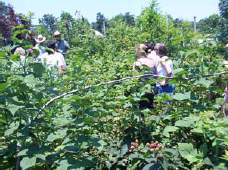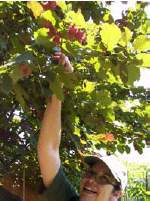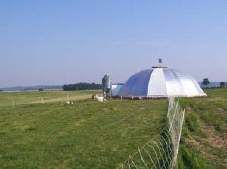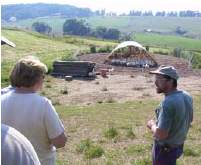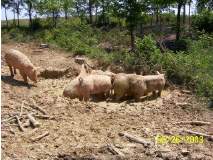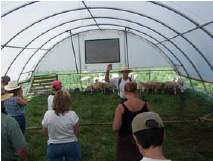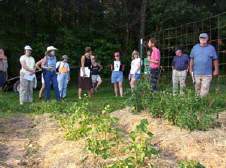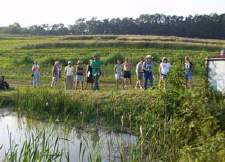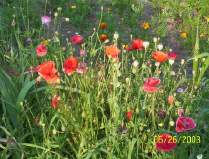Specialty Crops Program Farm Tour to Virginia-2003 Report
go.ncsu.edu/readext?452155
en Español / em Português
El inglés es el idioma de control de esta página. En la medida en que haya algún conflicto entre la traducción al inglés y la traducción, el inglés prevalece.
Al hacer clic en el enlace de traducción se activa un servicio de traducción gratuito para convertir la página al español. Al igual que con cualquier traducción por Internet, la conversión no es sensible al contexto y puede que no traduzca el texto en su significado original. NC State Extension no garantiza la exactitud del texto traducido. Por favor, tenga en cuenta que algunas aplicaciones y/o servicios pueden no funcionar como se espera cuando se traducen.
Português
Inglês é o idioma de controle desta página. Na medida que haja algum conflito entre o texto original em Inglês e a tradução, o Inglês prevalece.
Ao clicar no link de tradução, um serviço gratuito de tradução será ativado para converter a página para o Português. Como em qualquer tradução pela internet, a conversão não é sensivel ao contexto e pode não ocorrer a tradução para o significado orginal. O serviço de Extensão da Carolina do Norte (NC State Extension) não garante a exatidão do texto traduzido. Por favor, observe que algumas funções ou serviços podem não funcionar como esperado após a tradução.
English
English is the controlling language of this page. To the extent there is any conflict between the English text and the translation, English controls.
Clicking on the translation link activates a free translation service to convert the page to Spanish. As with any Internet translation, the conversion is not context-sensitive and may not translate the text to its original meaning. NC State Extension does not guarantee the accuracy of the translated text. Please note that some applications and/or services may not function as expected when translated.
Collapse ▲This is a 2003 report from a NC Specialty Crops Program Project. It is posted for historical reference purposes.
Reviewed by Jeanine Davis, NC Alternative Crops & Organics Program, Department of Horticultural Science, NC State University on 10/19/2022.
PROJECT LEADER(S): Richard Boylan
TYPE OF PROJECT: Educational
LOCATION: Ashe, Alleghany, and Watauga counties, NC
IMPACT
The New River Headwaters Counties of North Carolina are accessibly close to growing markets for naturally raised meats, eggs, fruits, container-grown specialty nursery plants, and organic vegetables. However, area growers often lack a sense of how this market growth is proceeding, and how to best serve these markets. Thanks to Specialty Crops funding, the New River Headwaters Alternative Agriculture Program was able to introduce fifteen growers from Ashe, Alleghany, and Watauga counties to leading innovators and successful business models in the areas of organic vegetables, edible landscape crops, and pasture-raised meats. A two-day trip facilitated active networking and hands-on learning at Seven Springs Farm, Edible Landscaping Nursery, Polyface Farm, and Pastured Peepers Farm. Participating growers stated unequivocally that they gained great insights into opportunities for profitable enterprises that they could replicate on their own farms.
INTRODUCTION
The New River Headwaters Counties of North Carolina are accessibly close to growing markets for naturally raised meats, eggs, fruits, container-grown specialty nursery plants, and organic vegetables. However, area growers often lack a sense of how this market growth is proceeding, and how to best serve these markets. Thanks to Specialty Crops funding, the New River Headwaters Alternative Agriculture Program was able to introduce fifteen growers from Ashe, Alleghany, and Watauga counties to leading innovators and successful business models in the areas of organic vegetables, edible landscape crops, and pasture-raised meats. A two-day trip facilitated active networking and hands-on learning at Seven Springs Farm, Edible Landscaping Nursery, Polyface Farm, and Pastured Peepers Farm. Participating growers stated unequivocally that they gained great insights into opportunities for profitable enterprises that they could replicate on their own farms.
METHODS
Growers from Ashe, Alleghany, and Watauga counties were the primary participants. The van departed from Ashe County, and traveled to the Shenandoah Valley of Virginia. Education took place primarily via farm tours and discussions with the successful growers chosen as stops. Participants also gained knowledge and insight via discussions during travel and meal times.
RESULTS
At least five of the participants have diversified their farming operations with complementary enterprises viewed during the tour. The balance of the participants report that they plan to incorporate elements of specialty crops diversification in the near future. A talk on the trip has been given at several venues, including the 2004 Vegetable Growers’ Conference in Asheville (estimated total audience: 75 people).
CONCLUSION
This trip had an immediate and positive impact on participating growers. The photos obtained during the trip, and the PowerPoint presentation created from it, are extending the impact indefinitely.
Photos



